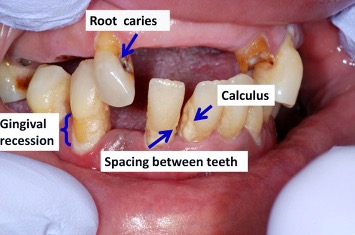Your Guide to Total Health and Wellness
In the Bahamas, the statistics on uncontrolled diabetes is staggering. This confirms a public health crisis. The prevalence of diabetes in 2005 was 6.7 percent. It has now reached almost 15% per cent and if we include pre-diabetics, we have a prevalence of almost 20 per cent. Our death rate from diabetes stands at 38 deaths per 100,000 persons- Ministry of Health.
In this issue, we will discuss how diabetes affect dental and overall health. Personal responsibility is critical in its management.
The prevalence of diabetes is directly related to lifestyle choices. Diabetes, is now the fifth leading cause of death in The Bahamas.
Diabetics are at greater risks for poor health. It is one of the leading comorbidities that places great strain on the body’s ability to heal. The immune system is made up of white blood cells called neutrophils. The sole function is to eat up the bacteria and stop them. However, in many diabetics the neutrophils no longer can sense the bacteria so the disease spreads and infections get worst. This is one reason why diabetics are more prone to medical infections as well. However, if the diabetes become controlled, the neutrophils recover and can find and kill the bacteria.
While the blood test commonly used to diagnose diabetes is called the Hemoglobin A1C, which averages your blood sugar control over 60 to 90 days; recent studies suggest that what may be more important is the control of “spikes” in your blood sugar levels.
Each spike, occurring after a high sugar or starch meal can cause damage.
Those who feel that you can cheat and keep your blood sugar low for the next couple of days to make your A1C look better, it just doesn’t work that way. That is one reason why your medical doctor wants the blood sugar to be tested throughout the day to be sure that your diabetes is continually under control. In that way, your neutrophils are always protecting you from infection.
The good news is that if you are diagnosed as a Type 2 diabetic and you are “controlled” along with good dental care, you have a good chance of keeping your teeth and reducing your chances of generalized infections as well.
Diabetics are more prone to dental diseases. Periodontal disease involves the loss of bone support for the teeth. Statistics by the American Academy of Periodontology, place periodontal disease at 50 per cent of the adult population. This makes periodontal disease one of the most prevalent diseases in The Bahamas. It is usually identified by a dentist or dental hygienist during examinations or cleanings. Where there is bone loss it forms a “pocket”. The deeper the pocket, the more severe the disease.
Take control of your health because oral care is critical to overall health.
The higher your blood sugar, the greater damage to teeth and gums. Additionally, more acid is produced further eating away the enamel.
Also, infections such as periodontitis cause blood sugar levels to rise. This in turn, makes diabetes more difficult to control. Preventing and treating periodontitis with regular dental cleanings can help improve blood sugar controls.
Make a commitment to manage your diabetes. Monitor blood sugar levels and follow doctor’s instructions for keeping blood sugar levels within your target range. The better controlled the blood sugar levels are the less likely one is to develop gingivitis and other dental problems.
Brush at least twice a day. Brush in the morning and especially at night just before bed time. Use a soft-bristled toothbrush and a toothpaste that contains fluoride. Avoid vigorous or harsh scrubbing which can irritate your gums and damage your teeth. Use a new toothbrush at least every three months.
Floss at least once a day. Flossing helps remove bacterial plaque between your teeth and under your gumline. If there is trouble getting dental floss through the teeth, use a waxed floss. If it’s still too difficult to manipulate the floss, then use a floss holder.
Schedule regular dental visits. Visit your dentist at least twice a year for professional cleanings, X-rays and follow-ups.
Inform your dentist of your diabetes. Every time you visit your dentist, remind them that you are a diabetic. The effective management of diabetes is a life-long commitment that includes proper dental care. Undoubtably, personal efforts will be rewarded in the long- term with a greater sense of health and vitality.
Dr. Kendal V. O. Major is Founder and CEO of Center for Specialized Dentistry which is a comprehensive family dental practice operating in Nassau and Freeport. He is the first Bahamian Specialist in gum diseases and dental implants since 1989. He also is a certified Fast braces provider. His practice is located at 89 Collins Avenue, Nassau at (242)325-5165 or [email protected].

Severe diabetes related gum disease and cavities- results from poor healing

Severe gum infection associated with uncontrolled diabetes





